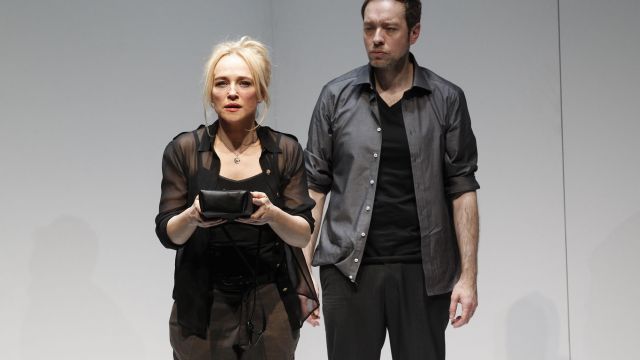Death and The Maiden
Ariel Dorfman’s powerful and visceral play, set in a post Fascist, newly democratic, South American country (Dorfman is from Chile), is full of passion and intensity and themes of vengeance, paranoia, forgiveness and moral ambiguity. Or it should be. Please do not judge it by this lack-lustre, passionless production.
Dorfman intended the play to unfold as a “what happens next” political thriller, with life and death stakes, but the production flounders after the first five minutes and instead we yawn through tepid and terribly middleclass performances to what should be a shocking (if ambiguous) conclusion, but isn’t. And the liberties taken with the ending in the final scene of the play would not, I feel certain, be to Mr Dorfman’s liking.
Basically the story concerns Paulina, still traumatised and mentally fragile fifteen years after her capture by fascists, which resulted in torture and rape. Her husband, Gerardo, is a newly appointed Justice Minister in the democratic government, charged with investigating unlawful abductions and killings under the previous regime. Into their lives comes a doctor, Roberto Miranda, a good Samaritan who has helped Gerardo with a flat tyre. From only the sound of his voice, Paulina is convinced he is the leader of the men who raped and tortured her, a doctor who played Schubert while torturing her. But is she right, or crazy? And when Miranda confesses, under duress in a “Kangaroo Court,” is he guilty or merely an innocent man trying to save his life? There are no definitive answers….no absolute truths, just as there are none in life itself. We are torn between believing first Paulina’s avenging angel and then Miranda’s innocent in danger.
I am trying to understand how Director Leticia Caceres, a woman of great passion (and surely sympathetic to the subject matter) has helmed something so dry and ho-hum. We know Dorfman’s thrust lies in allegorical sub-text (does Miranda actually represent the sins of the fascist regime, whether he himself is innocent?) and his language is simple… but it’s never boring, as this production makes it. And there is odd blocking in the strange 3-roomed revolving set, each room triangular with two doors. Actors make moves without motivation that play against emotional truth, sit down when the text is crying out for movement. Indeed you would be hard pressed to find a moment of truth in the entire play, save for Miranda’s relief when Paulina’s panties are removed from his throat after ten performance minutes of gagging him. Everything is undercooked and appears fake. Is this by design? Or is it just impossible to do such a play with local accents? There’s no way of knowing.
Susie Porter is an actor of considerable charm and ability. Her character has endured unspeakable horrors, and yet there is no sense of pain, or fear of going mad, even deeply hidden. It’s as if she’s mildly pissed off that Miranda stole her shopping list and made her late for the supermarket. We know the actor is capable of great depth, yet she didn’t bring it on stage for the opening night. Instead she brought bland, almost dis-connection, when every fibre of her being should be screaming for truth. Steve Mouzakis (Gerardo) is an award-winning actor, but it isn’t apparent here. If he could not bring us truth, I would have settled for some technique, but it seems he graduated from the “Air Stewardess Pointing and Stiff Hand Gestures School of Acting”. Only Eugene Gilfelder gives us a 3 dimensional reading of the character. His Miranda is alternately charming and insidious, a hapless innocent and an insidious monster. Unfortunately it still isn’t strong enough.
Where Dorfman deals with sounds and long silences, this production fills them with a soundscape by The Sweats, which endeavours to create an underscore of emotion to make-up for the lack of it in performance. The set and lighting by Nick Schlieper are interesting for the first 10 minutes, but then impose limitations on how far the action can be taken, and ultimately hamper rather than enhance the whole story. All of these elements are reasons why you need to come to this modern classic through some other production.
Coral Drouyn
Photographer: Jeff Busby
Subscribe to our E-Newsletter, buy our latest print edition or find a Performing Arts book at Book Nook.

